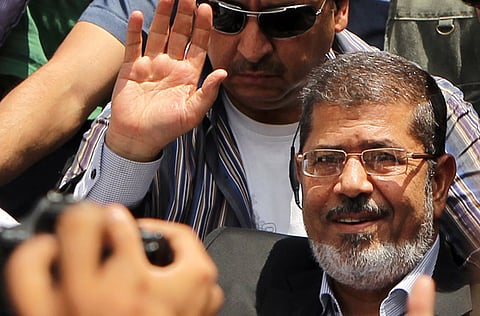Mursi had a simple childhood as farmer’s son
Mursi promoted Brotherhood’s “renaissance project”

Cairo: Muslim Brotherhood’s Mohammad Mursi travelled across the country, promoting the Brotherhood’s “renaissance project” — an 80-page manifesto based on what it terms its “centrist understanding” of Islam.
The son of a peasant farmer, Mursi has spoken of a simple childhood in a village in the Nile Delta province of Sharqia, recalling how his mother taught him prayer and the Quran. He obtained his doctorate from the University of Southern California in 1982 after earlier studying at Cairo University.
Following his studies in the United States, he returned to Egypt in 1985. Two of his five children hold US citizenship.
Head of the Freedom and Justice Party, which the Brotherhood established last year to promote its aims in the new party political system, Mursi has been described as an apparatchik.
His daughter is married to the son of another Brotherhood leader and he has described his wife, who wears a headscarf, as a Brotherhood activist.
Pushed by one TV interviewer to clarify what Islamist rule might mean for bikinis on Red Sea beaches - and so for Egypt’s vital tourist industry - Mursi did not give a clear answer.
He described such issues as “very marginal, very superficial and affecting a very limited number of places”, adding that sector specialists must be consulted on all draft laws.
It was typical of the vagueness that has fuelled concerns among those Egyptians whose fears were also exacerbated by other elements of the Mursi campaign, including his early efforts to court the ultraorthodox Salafi Islamist movement.
The Brotherhood’s “renaissance” programme sketches out the group’s vision on everything from fighting inflation to remaking ties with the United States as a partnership of equals. It envisions deeper ties with Turkey — a Muslim state which Brotherhood leaders often cite as a model of success.
On Israel, Mursi’s views reflect those of the Brotherhood. He has called for a review of Cairo’s 1979 peace treaty with its Jewish neighbour, saying Egypt’s neighbour has not respected the accord. But the group has said it will not renege on the deal.
Mursi has cited fear of judgment day as one reason for seeking the top office. He said: “We are worried that God will ask us, on the day of reckoning: ‘What did you do when you saw that the nation was in need of sacrifice and effort?’”



